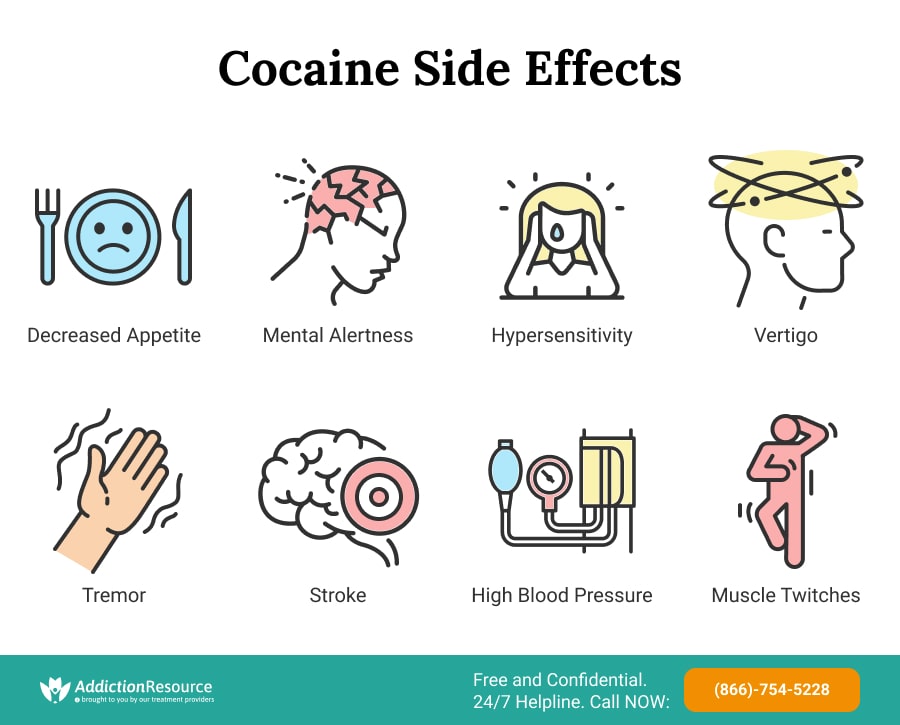Cocaine, also known informally as snow, joy powder, blow, rock, and coke, is a stimulant derived from the native coca plant in South America. The substance is a schedule II controlled substance.
Table Of Contents:
Cocaine use has increased exponentially over the years. In 2015, reports showed that about 968,000 people within the age of 12 and above initiated the use of cocaine in the previous year, at a 26% increase. According to the National Institute of Health, sudden death right after taking coke can usually occur when coke has been mixed with other stimulants. The salient escalation of exposures and death cases related to the substance is deeply rooted in culture, excess availability, and addictive potential.
In the medical field, various other products are developed yearly to displace coke use in any form of clinical use; this is largely because the drug has created massive economic and health burden with its mind-altering properties.
What are the side effects of cocaine in the short and long term? What are the health risks associated with addiction to the drug? Are damages caused to the system reversible? What population is most at risk?
Physical and Behavioral Short-Term Cocaine Side Effects
The properties of coke manifest almost immediately after taking the substance. That’s because it enters the bloodstream and is absorbed rapidly. The result is the instantaneous feelings of euphoria that users experience. Initially, coke also increases the levels of norepinephrine and serotonin.
Physical Short-term Cocaine Effects
Some common short-term neuro-physical cocaine side effects are increased pulse rate and blood pressure caused by an increase in norepinephrine levels and abnormal rhythms. According to the research, chest pain is one of the most common side effects of cocaine that requires a visit to the emergency room. That’s because cocaine side effects constrict blood vessels in the short term and affect the heart’s natural rhythms. On the other hand, cardiac arrhythmia caused by drug use may not resolve on its own and can worsen and lead to a cardiac arrest.
Sudden death from cardiac failure is possible even in first-time users or right after taking large amounts of the substance.
The Physical Properties of a Cocaine-Induced Euphoria Include:
- Increased energy
- Mental alertness (due to increased norepinephrine)
- Decreased appetite and sleep (due to increased serotonin)
- Hypersensitivity to smell, sound, and touch.
- Increased levels of norepinephrine
- Increased pulse rate
- Elevated blood pressure
- Chest pain due to vasoconstriction
- Headaches
- Vertigo
- Uncontrollable muscle twitches
- Tremors
- Seizures
- Cardiac arrhythmia
- Stroke
- Coma
Seizures, strokes, and coma can accompany coke overdose. According to the findings of the study, conducted by Sean Treadwell and Tom Robinson, cocaine side effects can lead to strokes and coma or sudden death even in persons with no cardiovascular risk factors. This is because coke constricts blood vessels and may lead to the formation of life-threatening clots.
Behavioral Short-Term Cocaine Effects
Some users may binge on coke. Sometimes the side effects of cocaine may return, more intense, and manifest as:
- angry outbursts
- aggression
- irritability
- talkativeness
- hallucinations
- delusions
- restlessness
- anxiety
- panic
- paranoia
What Are Long-Term Side Effects of Cocaine?
Prolonged coke consumption can cause severe damage to health, such as:
- Increased risk of stroke and seizure
- Liver damage
- Kidney damage and, in some cases, chronic or acute kidney failure
- Damage to the walls of the gastrointestinal tract
- Damage to the nasal membrane, lungs, and other tissues depending on the method of ingestion
- Brain swelling
- Bleeding of the brain
- Impaired cognitive function
- Increased risk of contracting Hepatitis C and AIDS
- Death
Long-Term Cocaine Effects on the Heart
The long-term cocaine effect on the heart is well-documented. Both coke vs crack causes inflammation of the heart muscle and imbalances in potassium, sodium, and calcium channels. Another symptom is the narrowing of the blood vessels and arteries that, in turn, restricts blood flow to the heart and increases the chances of developing blood clots, aortic ruptures, heart attacks, and strokes.
Some of these symptoms can lead to cardiac arrest and death.
Long-Term Cocaine Effect on Sinuses
The mucous membrane of the nose can be damaged, exposing the septum, cartilage lining between the nasal cavity. Septum perforations and degeneration is typical with addicts and often lead to breathing issues and a distorted nose structure. Those who use coke orally also expose themselves to a similar occurrence at the upper palate of their mouth; this is mostly seen in long-term abuse.
Long-Term Cocaine Effects on the Brain
Continuous use of the drugs not only constricts blood vessels but also reduces oxygen supply to the head; this could lead to damages in the CNS. Cocaine effects expose the CNS to various threat and problems such as:
- Aneurysm (vascular wall damage)
- Cerebral atrophy (the shrinking of the human brain)
- Transient ischemic attacks
- Hyperpyrexia (high fever)
- Coordination problems such as tremors, changes in gait, muscle weakness
- Seizures
- Cerebral Vasculitis (inflammation in the blood vessels)
Long-Term Cocaine Effects on the Respiratory System
Many coke users seem to prefer snorting the drug to administering it in any other way. Inhaling causes the coke vapors to reach the CNS straight from the lungs. Inhaling it can cause a host of pulmonary complications like edema, hemorrhage, infection, asthma, and bronchitis. Chronic cocaine users often have shortness of breath, coughing, wheezing, and chest pain.
The respiratory issue caused by snorting the drug is extensive as alveolar walls are damaged, and blood vessels constrict, cutting off oxygen from the bloodstream, which causes poor oxygen distribution. The threat of respiratory infection is very high, and maladies such as Asthma, chronic cough, pneumonia, tuberculosis, and others.
Eosinophilic pneumonitis, also known as “crack lungs,” may also develop in people who snort cocaine.
Symptoms of this Respiratory Condition May Include:
- High body temp
- Recurring pain
- Dark sputum
- Wheezing sounds
- Increased white blood cell presence
Long-Term Cocaine Effects on Kidney
Long-term cocaine effects on the kidneys are extensive. Renal complications of substance abuse are common because the kidneys filter most of these drugs and their metabolites. Cocaine is also known to be nephrotoxic, which means that just by introducing it in their bodies, users damage their kidneys to some extent. Cocaethylene, a metabolite of cocaine, is also known to damage the kidneys.
According to another research, cocaine abuse can lead to chronic or acute renal failure by keeping blood pressure levels persistently elevated, producing harmful free radicals that inflict oxidative stress, or damaging the renal cells directly. Cocaine constricts and thickens the blood vessels and arteries of the kidneys. This reduces blood flow to the organ that ultimately damages it.
Long-Term Cocaine Effects on Liver
Cocaethylene is associated with liver damage. Acute coke intoxication can cause liver dysfunction by raising the levels of bilirubin and killing cells. According to the National Institute of Diabetes and Digestive and Kidney Diseases, some cocaine-induced liver damages resolve on their own within a few days. However, chronic coke worsens liver damage and can lead to death, usually through multi-organ failure.
Long-Term Cocaine Effects on Gastrointestinal Tract
Individuals who abuse the powder in the long-term may experience a condition known as “necrotic bowel,” which is basically the death of essential tissue in the gastrointestinal tract. This is because of the damage caused in the organs over time by the reduced blood circulation in the body as well as the intensification of side-effects of cocaine such as stomach pains, constipation, and others. Other medical problems experienced by addicts include ulcers (caused by PH changes in the stomach) and Ischemic colitis (large intestine inflammation), which could be fatal.
Long-Term Neurological Side Effects of Cocaine
There are several potentially life-threatening neurological side effects of chronic abuse. Long-term use of cocaine increases the threats of strokes and seizures. Chronic users can also suffer from bleeding inside the brain and swelling of the walls of the cerebral blood vessels. Both these conditions can increase the threat of life-threatening clots forming inside the brain.
Chronic coke abuse can cause memory disturbances and increase the threat of developing Parkinson’s disease.
This study states that coke abuse damages gray and white matter in the brain. This impairs cognitive functionalities and inhibits the impulse control mechanism; thus impaired, users exhibit poor decision-making, risk-taking tendencies, and rash, mindless behavior that can harm both themselves and those around them.
One of the most severe signs of long-term cocaine use is the development of coke dependence. For abuse to turn into an addiction, considerable neurobiological changes must occur. The alterations in CNS chemistry make it extremely hard for the addict to voluntarily give up the drug. Trying to quit the addiction results in coke abstinence syndrome with unpleasant side effects—anxiety, paranoia, depression, and aggression—that resemble the “crash” of the coke withdrawal phase. So addicts are compelled to seek out the drug.
Long-term Psychiatric Effect of Cocaine
Chronic abuse triggers psychiatric symptoms in almost all users. Several studies indicate that restlessness, aggression, confused thinking, hallucinations, paranoia, delusions, and delirium are some common psychiatric side effects of cocaine abuse.
- Persistent feelings of suspicion that intensify to a state of paranoia are the classic symptoms of psychosis. Depression is also seen in some chronic users of the substance.
- Alterations in the dopamine, serotonin, and norepinephrine levels can lead to delirium. This is a potentially fatal condition characterized by confusion and rapid blood pressure and pulse rate fluctuations caused by autonomic nervous system dysfunction.
- According to some researchers, some neurological and psychiatric effects cumulatively give rise to a violent streak in cocaine-dependent individuals. Paranoia increased irritability and aggressiveness, inability to think coherently, and poor impulse control make a person prone to violence.
Cocaine Weight Loss
In general, when a person takes cocaine, the body kicks into a fight or flight mode with heightened senses, faster breathing, dilated pupils, an increase in the availability of neurotransmitters like dopamine, among other signs. In such a state, the body down-regulates the need for food while at the same time increasing the metabolism rate.
With repeated use, the body experiences a sustained net-negative calorie count, one of the possible reasons people who take the drug are thin. A recent study expanded this understanding of how cocaine weight loss works by discovering that it alters how the body stores fat. After prolonged use, they discovered there was a notable change in how the body stores fat.
In the study, the subjects, though consuming high-fat meals all day, did not seem to store any excess fat as compared to the non-drug-users. So, does frequent use of the substance cause cocaine weight loss? The study did seem to support the notion. However, the study did not include other factors like frequency of eating, quality of meals, etc. The study also found some serious negative effects associated with this “diet”.
How Fast Does Cocaine Make One Lose Weight?
Some individuals, especially college students, maybe using the drugs without adequate knowledge about its weight altering properties. Cocaine weight loss associated with the frequent use of the substance is dangerous.
Short-term: 0-6 months
When a person starts taking coke, the body responds in several ways. As the drug is known to suppress appetite, the person will eat less. Cocaine effects on metabolism are increased activity in the form of extended waking hours, being nervous and fidgety, etc. These account for more calories burned.
Mid-term: 6-24 months
Between six and twenty-four months, the mid-term signs of using cocaine begin to become evident. Tolerance to the drug begins to set in, and dependence begins to form. For the person, it may appear as fair trade as, by this time, they will have shed another ten percent of their body mass. If the person were three hundred pounds at the beginning, they would now be two hundred and forty pounds. Both their neural reward pathways, as well as, other gut regulation pathways will also have reached an advanced state of alteration.
Long-term: 24+ months
From twenty-four months onwards, loss of weight increases sharply as the person skips more meals, focuses more on drug-seeking behaviors, and generally does a poor job of taking care of themselves. Because of poor nutrition and infrequent eating, the drug makes a person lose weight from malnutrition rather than controlled calorie intake. The person will develop a susceptibility to opportunistic diseases that will further compromise the body’s ability to self-repair and store fat.
There are so many threats and dangers involved with losing weight on coke.
Some of the Short Term Side Effects Include:
- Poor eating habits: Due to appetite suppression, the person will develop eating habits that may deprive them of vital nutrients.
- Malnutrition: Follows closely after poor habits develop.
- Neurological problems: These may include headaches, strokes, seizures, and in some cases, coma.
- Gastrointestinal complications: The drug’s reduction of the flow of blood to the gut reduces gut motility resulting in pain, nausea, or rotting of the gut.
- Paranoia, anxiety, and erratic behavior: These symptoms can compromise a daily life and disrupt activities like school or work.
- Tolerance and addiction: As the CNS gets used to operating on the drug, tolerance and addiction set in quickly.
- Dependence: Physical and psychological dependence can also develop, making it hard to stop taking it even after achieving the target.
Is there a weight gain after quitting the drug? In the study that found that cocaine effects suppress the body’s ability to store fat, the researchers also found that after removing the drug, the body went back to normally storing fat, resulting in rapid weight gain.
Cocaine and Risky Behavior
Cocaine use has played a major role in impulsive delinquency among its users, specifically young adults, and is usually an accompanying theme in juvenile misconduct. The high-risk behaviors reported, such as driving while on drugs or cocaine sex, leading to the spread of STDs, is largely recurring with individuals that use the powder. Essentially, the stimulating and euphoric properties of the drug negatively impact decision-making abilities and invariably causes people to exhibit dare-devil characteristics or make regrettable life decisions that may be irreversible.
Driving on Cocaine
Most drug users may think the drug gives them heightened alertness and quicker reflexes. The reality is that driving on coke changes one’s state of mind leading to greater risk-taking on the road.
While it is hard to estimate the exact number of accidents caused by persons driving on coke alone, accidents caused by drivers on non-alcohol illicit drugs account for 16% of all motor accidents. This represents 1,680 deaths per year. Also, as most people use coke and alcohol together, the coke tends to suppress the feeling of inebriation, leading to alcohol-related accidents.
In the US, drunk driving deaths account for 28% of all motoring accidents. This is the loss of 10,497 lives each year because of impaired persons getting behind the wheel to drive.
How Can the Use of Coke Affect Driving?
In short, its symptoms make the person unable to act and react in tandem with the rest of the motorists, a recipe for disaster.
Coke use while driving has contributed greatly to road accidents, one of which is the record of 265 fatally wounded drivers reported from 1999 to 2000. The victims were confirmed to have used the drug as forensics found substantial proportions of metabolites in blood and urine samples.
In 2016, 43.6% of fatal car crashes were all reported to have been linked to drug abuse.
How Does Cocaine Affect Driving?
If a person has been smoking coke or taking it through any of the other intake methods, the last thing they should do is get behind the wheel of a car.
When a person takes the powder, the drug immediately crosses the blood-brain barrier and impacts serotonin transmitters that regulate arousal and alertness. In this state, the person will get into an energetic state of euphoria, inflated self-esteem, and a general sense of mood elevation.
If a Person Starts Driving in Under the Infuence of Coke, it Affects the Driver by Causing the Following:
- Over speeding: The drug high usually causes a surge of emotion, causing the driver to become reckless by overspeeding and putting both their own lives and the lives of others at risk.
- Road rage: The nerve altering drug also causes shifts in moods and may cause increased levels of aggressiveness. This is evident in the forms of road rage, impatience, and irritability.
- Dangerous lane-changing: It is typical for drivers on drugs to feel impatient while driving. They are more likely to switch lanes dangerously, neglecting traffic rules, and finding it really difficult to stick to one lane.
- Loss of control of the car: Loss of coordination and poor reflexes are negative effects of using the drug while driving, especially at a dangerously high speed beyond the accepted limit.
As the euphoria wears off, a separate set of symptoms start kicking in that can also lead to poor driving skills and judgment. As most persons that take the drug only consider the upside of taking it, the downside of coke use symptoms is equally debilitating.
Some of the Most Dramatic Properties of Cocaine on Driving are:
- Headaches: The splitting headache that follows the wearing off of the drug can impair cognitive and visual abilities. This can lead to a loss of concentration while driving.
- Irritability: Mood swings and high irritability is a side effect of drug use while driving. The short-temperedness could lead to reckless decisions.
- Panic: The physical properties of coke comedown can cause a feeling of panic, and anxiety which can affect driving skills as well as reflexes.
- Paranoia: This is perhaps the most dangerous as it can cause the driver to make brisk thoughtless driving decisions in their uncontrolled suspicion and instability, which could lead to a fatal accident.
Consequences of Driving on Cocaine
Driving under the influence of drugs is dangerous because every motorist becomes a target of their aggression. Their mood swings, irritability, and drug-induced boisterousness may cause them to harass other drivers by tailgating them, honking repeatedly, or attempting to overtake them at dangerous points. These disruptive behaviors are not only dangerous to health but also have legal consequences.
In the United States and other countries, driving while under the influence of a drug is an offense punishable by law. If a person is caught driving while on coke, their license can be revoked and other sanctions imposed. This can be thought of as the best-case scenario, where there are no casualties.
In the worst-case scenario, driving in such a state can lead to a fatal road crash resulting in the loss of lives of the offender on the drug and other motorists. If the person on coke survives, they may be faced with manslaughter charges that will be paid in jail time. The risks associated with taking the drug and driving are in manifolds, and as such, anyone contemplating taking the drug should not, under any circumstances, drive a vehicle. There are also other dangers associated with taking cocaine-like getting cocaine overdose symptoms.
Cocaine Sex
There is a correlation between cocaine sex and erectile dysfunction. The use of coke during sex is termed reckless, with many users facing the consequences of unprotected and generally dangerous cocaine sex due to the mind-altering effects of the drug. The negatives of cocaine use during sex are mostly long-term, and though many users are enthralled by the short-term “high,” the risk, in general, is quite extensive.
Does Cocaine Cause Male Sex Problems?
Cocaine sex in the long-term can be problematic, with a lot of side effects on male health.
Coke use in the long-term has been linked with erectile dysfunction and a lower sperm count. As much as this causes clear physical issues, it further affects the user psychologically. In addition to the drug causing erection issues, it can also encourage the practice of unsafe sex. This can lead to both unwanted pregnancy and the transmission of sexually transmitted diseases. According to Sex Info Online, the stimulant impairs immune cell function, so users are more exposed to diseases as the body can defend against them. It also promotes the replication of HIV and enhances its symptoms.
In addition to the physical health problems the drug creates, it can also make users engage in the activity they wouldn’t normally consider. Activities such as sexual assault, theft, and rape have all been linked with drug use.
Various researches have been conducted on the symptoms of the drug in both males and females, and it has also been discovered that males are more likely than females to show blood-flow abnormalities in the frontal lobe. This sex-related health issue proves that the detrimental side effects of cocaine use are more dominant in the male CNS.
Does Cocaine Cause Female Sex Problems?
Indulging in cocaine sex is also common in the female gender. Cocaine use can cause some sexual health problems for women. It can impair judgment and encourage the practice of unsafe sex, which in turn spreads sexually transmitted diseases and leaves room for mistakes such as an undesired pregnancy.
The stimulant can also have adverse effects on fertility. Coke alters the menstrual cycle of a woman and can ultimately stop ovulation. Furthermore, it damages the fallopian tubes. This can make child conception very challenging. In addition to all that, the drug can also permanently affect delicate hormonal balances, which can create permanent low moods, lower sex drive, and make conception less likely.
Cocaine use during pregnancy can lead to more adverse effects. According to Sex Info Online, the substance is linked with premature delivery, maternal migraines, seizures, and placental abruption. This can cause the child to be stillborn or born with health issues.
Furthermore, the drug exacerbates cardiovascular changes during pregnancy. This can lead to severe problems with the child’s delivery and, in extreme circumstances, miscarriage. The substance can also cause both physical and cognitive developmental issues in a child. They may be born smaller than average and in later life struggle with memory and recollection.
Dangers of Cocaine Use During Pregnancy and Breastfeeding
Cocaine use during pregnancy is extremely dangerous and may cause some unwanted health issues to both the user and the child. The drug affects babies during pregnancy by restricting blood vessels. This can constrain the baby and mean it doesn’t get exactly what it needs during pregnancy.
Some addicts struggle during pregnancy, and despite being abstinent during pregnancy, have the potential to relapse postpartum. A major factor to consider is that the infant may be exposed to significant amounts of the drug during breastfeeding. This is a major problem, especially in the U.S. At least 5-10% of pregnant women resident in North America are reported to have a cocaine addiction, and yet breastfeeding is an essential means of infant nourishment that cannot be substituted. Infants would ingest the drug components through breast milk but do not have the capacity to metabolize the drug. Hence, this would cause unprecedented damages in the system of the neonate in the long-term, depending on the amount of substance exposure.
Some Reports on Symptoms of Coke in Breast Milk Stated that the Neonate Might Experience Adverse Symptoms such as:
- Hypertension
- Irritability
- Tachycardia
- Seizures
- Agitation
This is not only by ingestion of breast milk but also by applying the drug on the nipple as a local anesthetic.
The Risks of Cocaine Use to the Pregnant Women
It is also important to be aware of the threat the substance poses to the pregnant woman, as well as the baby itself.
According to Reports from the CDC and NCBI, Taking Cocaine During Pregnancy may Cause:
- Premature delivery
- A maternal migraine
- Suicidal ideation
- Malnutrition
- Dyspnea
- Anxiety
- Pneumonitis
- Hyperthermia
- Anemia
- miscarriage
- Skin infections
- Postpartum depression
Taking coke pregnancy may also exacerbate normal cardiovascular changes in a woman. This leads to high blood pressure, spontaneous miscarriage, and difficult delivery, all of which may harm the woman and the child.
Is Cocaine Dangerous for the Unborn Child?
Coke is extremely dangerous to the unborn child. Maternal cocaine abuse can severely hinder fetal organ development, often causing brain and heart deformities and functional deficiencies. These children often suffer from cognitive and behavioral disorders and are at a higher risk of developing substance abuse disorders later in life.
There have been countless studies on and extensive media coverage of the adverse effect of cocaine on adults. But using cocaine during pregnancy can harm the woman and her unborn child as well. When a pregnant woman uses cocaine during the gestation period, the drug crosses the placenta and reaches the fetus. It is then distributed in the organs of the fetus in greater concentration than in blood. The developing heart and the nervous system of a fetus are at most risk from maternal cocaine abuse. There are both short- and long-term effects.
Here are the Dangers that Coke Use Poses to the Fetus:
- Seizures
- Premature membrane rupture
- Placental abruption
- Poor fetal oxygenation
- Pain
- Congenital anomalies (birth defects)
- Increased threat of heart disease in adulthood
- Fetal death
- Microcephaly ( abnormal brain development leading to small-sized head)
- Neonatal Arrhythmias (irregular heartbeat)
- Low birth weight
- Risk of spontaneous abortion
- Intrauterine growth retardation
- Urinary tract anomalies
- Neurodevelopmental delay in the fetus
- Sudden infant death syndrome (SIDS) – the inexplicable passing of neonate during sleep
- Learning difficulties
- Meconium staining – the release of meconium into the mother’s uterus which may expose the baby to swallowing prior to birth, leading to breathing problems
Effects of Cocaine Exposure on the Fetal Heart
According to the study, maternal abuse of coke leads to babies being born with structural deformities and functional deficiency of the heart and ventricle, abnormal rhythms, and conduction abnormalities. In many cases, these symptoms persist for months after birth.
A large number of studies have been carried out to determine the effect of prenatal exposure to coke powder on the nervous system.
The autonomic nervous system (ANS) regulates certain cardiac functions, and coke affects the ANS. In some studies, newborns that had been exposed to coke in utero had altered pulse and heart rate variability. Many researchers believe that long-term prenatal exposure to the coke can even depress the ability of the ANS to regulate cardiac functions to such an extent that these babies grow up with an increased threat of developing heart disease later in life.
The Properties of Cocaine Exposure on the Fetal Brain
Because coke affects the neurotransmitter pathways in the CNS, there have been many studies on the issues of prenatal exposure to the drug on the developing brain.
Prenatal exposure to coke powder inhibits the neurological development of the fetus. The results are abnormalities in the transmission of signals and structural and functional deficiencies in regions of the brain that control cognitive functions. For instance, in this study, infants who had been exposed to coke powder in utero show lesser gray matter in the prefrontal and frontal regions of the brain that controls executive functions.
Many of these changes are permanent, and according to this study, cocaine-exposed children exhibit increasing degrees of cognitive, behavioral, attentional, and motor deficits as they grow older.
These children have difficulty learning, behaving appropriately in social situations, and coping with stressors in life. As a result, many of them go through life experiencing difficulties in forming and sustaining meaningful relationships, holding on to jobs, and leading independent and unassisted lives.
But more disturbing is the finding of this study. Prenatal exposure to cocaine increases the risk of the child developing substance-abuse and binge-eating disorders during adolescence.
Dangers of Cocaine During Breastfeeding
Breastfeeding is absolutely essential, not just for child development and cognitive abilities but also for long term maternal health benefits. For women who used cocaine just before birth or during breastfeeding, this will significantly affect the health of the infant because of the coke components present in the breast milk. Everything ingested by the mother is metabolized and passed down to the newborn through breast milk. The drug is absorbed orally and passed down to the gut of the infant. The infant would be unable to metabolize and clear coke. Hence, the exposure would culminate in health problems. The sporadic adverse effects that may be experienced by the neonate may include seizures, tachycardia, high irritability, restlessness, and other issues.
The best way to avoid infant exposure to coke and to ensure the safety of either the unborn child or the neonate is to remain abstinent before and during pregnancy.
What Possible Irreversible Damage Can Cocaine Cause?
Cocaine and alcohol react to produce cocaethylene, a substance that magnifies the effects of alcohol and coke on the heart. According to research, cocaethylene can increase the risk of sudden death in persons who use the powder mixed with alcohol.
Heroin and cocaine taken together can also lead to fatal consequences. Because the stimulating effect of cocaine is offset by the sedating effect of heroin, users may unknowingly binge on heroin. The effect of cocaine subsides sooner than those of heroin. This then intensifies the properties of heroin and may cause respiration to slow down in the person and sometimes, stop altogether.
Besides the initial powerful kick, cocaine use triggers a host of short-term effects. The intensity of the symptoms depends on the amount of cocaine taken and the route of administration. For instance, this drug is absorbed faster by the body when it is injected. The resulting high comes on within minutes, and so do the other side effects. Binging on cocaine magnifies the high and also triggers more intense side effects that are usually not associated with taking small doses. However, many of these short-term effects subside almost immediately.
But with repeated use, short- and intermediate-term properties cumulatively go on to trigger a range of other physical and mental symptoms that last for months or years. Some of these effects are irreversible. According to a study published by PubMed, coke abuse leads to irreversible structural damage to organs like the CNS, heart, kidney, liver, and lung.
It is also disturbing to note that maternal abuse of coke adversely affects the CNS and the pulse of the developing fetus.
In some rare cases, an immediate effect of cocaine use can even be deadly. According to the National Institute on Drug Abuse, these are usually cases where cocaine use, usually an overdose, triggers a cardiac arrest or a stroke. Sometimes a cocktail of cocaine and heroin or cocaine and alcohol can trigger a fatal cardiac arrest.
Some coke symptoms are reversible, while some are not. The best bet is to seek medical treatment as soon as possible. Long-term use of coke leads to the damaging of chemical pathways with physical and psychological side effects. Seeking help quickly would enable one to manage the addiction even before getting pregnant. Rehab services provide extensive treatment for all levels of cocaine side effects and information on how to live a sober life.
Some Treatment for Coke Addiction Can be Offered in Various Ways, such as:
- Pharmacological methods – this treatment approach is based on medications such as baclofen and disulfiram that alter the properties of neurotransmitters.
- Behavioral therapy – the program is basically a treatment that addresses the behavioral adjustments and psychological properties of the drug. Behavioral intervention treatment services may include cognitive behavioral therapy and therapeutic communities.
To find help for coke addiction, contact a medical practitioner immediately for counseling.
Page Sources
- A De Giorgi, F Fabbian, M Pala, F Bonetti, I Babini, I Bagnaresi, F Manfredini, F Portaluppi, D P Mikhailidis, R Manfredini. Cocaine and acute vascular diseases. 2012 Jun;5(2):129-34. http://www.ncbi.nlm.nih.gov/pubmed/22455504
- Sean D Treadwell and Tom G Robinson Cocaine use and stroke. 2007 Jun; 83(980): 389–394 http://www.ncbi.nlm.nih.gov/pmc/articles/PMC2600058/
- Y Q Xu , W J Crumb Jr, C W Clarkson. Cocaethylene, a metabolite of cocaine and ethanol, is a potent blocker or cardiac sodium channels. 1994 Oct;271(1):319-25. http://www.ncbi.nlm.nih.gov/pubmed/7965731
- Varun Parkash Singh, Nirmal Singh, Amteshwar Singh Jaggi. A review on the renal toxicity profile of common abusive drug. 2013. http://www.ncbi.nlm.nih.gov/pmc/articles/PMC3741492/
- Ponnada A. Narayana, Juan J. Herrera, Kurt H Bockhorst, Emilio Esparza-Coss, Ying Xia, Joel L. Steinberg, F. Gerard Moeller. Chronic cocaine administration causes extensive white matter damage in the brain: diffusion tensor imaging and immunochemistry studies. 2014. http://www.ncbi.nlm.nih.gov/pmc/articles/PMC3943678/
- Kurt D. Meyer, Lubo Zhang. Short-and long-term adverse effects of cocaine abuse during pregnancy on the heart development. 2010. http://www.ncbi.nlm.nih.gov/pmc/articles/PMC2710813/#R46
- Sarah W Yip , Elise B Potenza , Iris M Balodis , Cheryl M Lacadie, Rajita Sinha, Linda C Mayes, Marc N Potenza. Prenatal cocaine exposure and adolescent neutral responses to appetitive and stressful stimuli. 2014. http://www.ncbi.nlm.nih.gov/pubmed/24903650
- Drug Enforcement Administration, COCAINE, 2019, https://www.deadiversion.usdoj.gov/drug_chem_info/cocaine.pdf
- R E Mittleman, C V Wetli. Cocaine and sudden “natural” death. 1987. https://pubmed.ncbi.nlm.nih.gov/3819672/
- Karen D. Ersche, Jan Stochl, Jeremy M. Woodward, Paul C. Fletcher. The skinny on cocaine: insights into eating behavior and body weight in cocaine dependent men. 2013. https://www.ncbi.nlm.nih.gov/pmc/articles/PMC3863945/
- M T Fullilove, E Golden, R E Fullilove 3rd, R Lennon, D Porterfield, S Schwarcz, G Bolan. Crack cocaine use and high- risk behaviors among sexually active black adolescents. 1993. https://pubmed.ncbi.nlm.nih.gov/8347641/
- C Dussault, M Brault, A M Lemire, J Bouchard. The role of cocaine in fatal crashes: first results of the Quebec drug study. 2001. https://pubmed.ncbi.nlm.nih.gov/12214346/
- National Institute on Drug Abuse. Drugged Driving Drug Facts. https://www.drugabuse.gov/publications/drugfacts/drugged-driving
- National Institute on drug abuse. Substance Use in Women Research Report Sex and Gender Differences in Substance Use. 2020. https://www.drugabuse.gov/publications/research-reports/substance-use-in-women/sex-gender-differences-in-substance-use
- Chaya G. Bhuvaneswar, Grace Chang, Lucy A. Epstein, Theodore A. Stern, Cocaine and opioid use during pregnancy: prevalence and management. 2008. https://www.ncbi.nlm.nih.gov/pmc/articles/PMC2249829/
- Melissa M. Martin, Devon L. Graham, Deirdre M. McCarthy, Pradeep G. Bhide, Gregg D. Stanwood. Cocaine-induced neurodevelopmental deficits and underlying mechanisms. 2016. https://www.ncbi.nlm.nih.gov/pmc/articles/PMC5538582/

 Authored by
Authored by  Reviewed by
Reviewed by 






